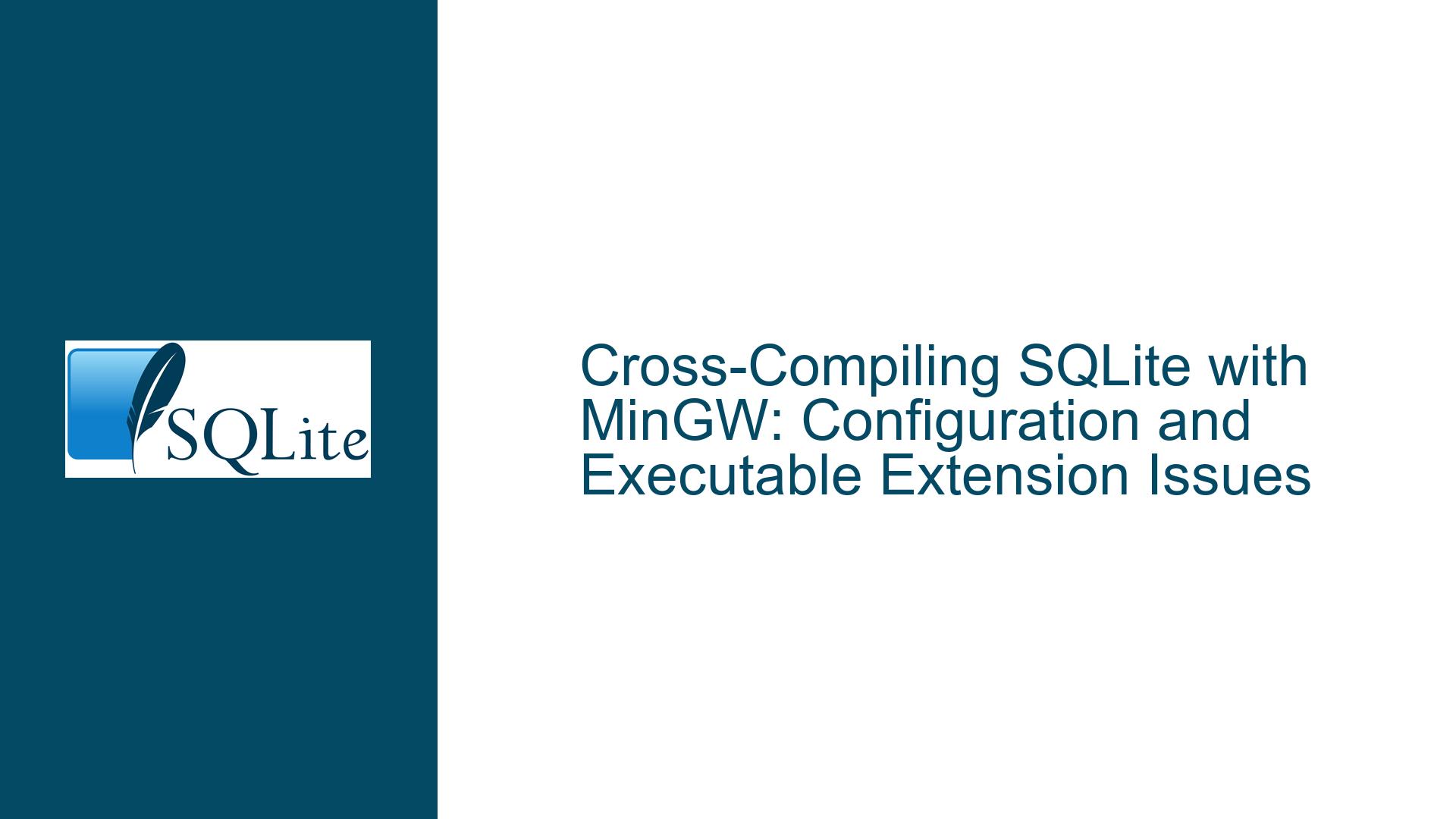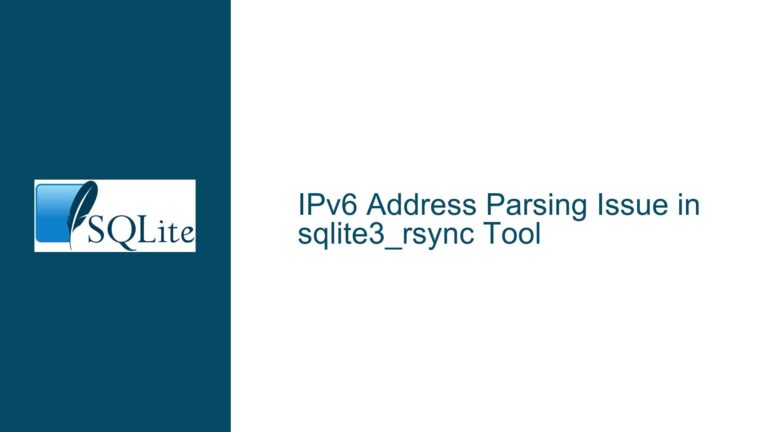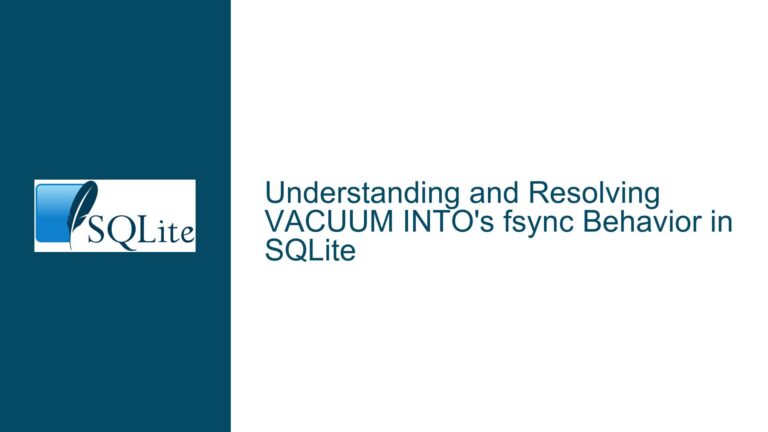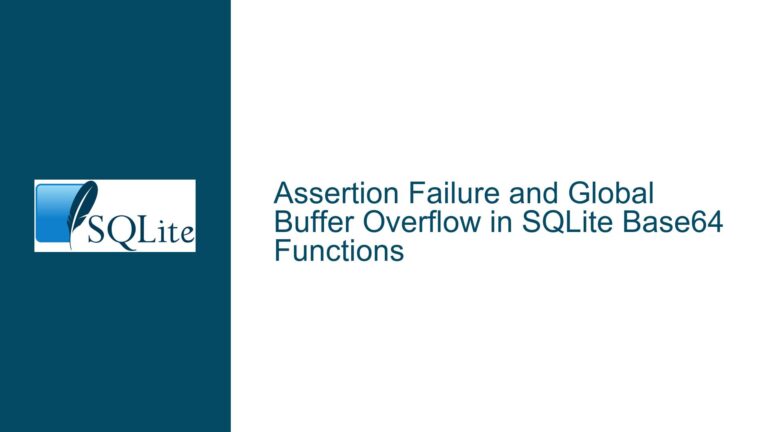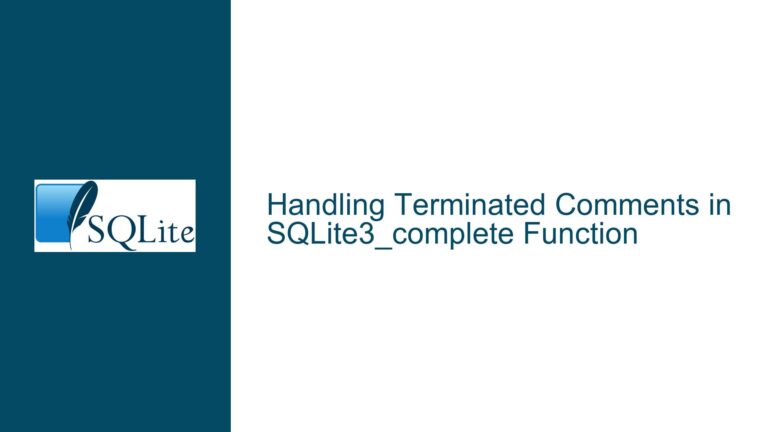Cross-Compiling SQLite with MinGW: Configuration and Executable Extension Issues
Issue Overview: Cross-Compiling SQLite with MinGW and Executable Extension Mismatch
Cross-compiling SQLite using MinGW involves configuring the build process to generate binaries for a target platform (Windows) from a host platform (typically Linux or macOS). The core issue arises during the configuration and build phases, where the system fails to correctly handle executable extensions (.exe for Windows) when generating intermediate tools like mksourceid. This mismatch leads to a build failure because the build scripts attempt to execute a binary without the .exe extension, which is required for Windows executables.
The error message indicates that the script mksqlite3h.tcl is trying to execute mksourceid, but it cannot find the executable because the script is not appending the .exe extension. This issue is rooted in the configuration logic, specifically in how the configure and configure.ac scripts handle the EXEEXT and TARGET_EXEEXT variables during cross-compilation.
The configure script correctly detects that the cross-compiler (x86_64-w64-mingw32-gcc) generates executables with a .exe extension and sets the ac_cv_exeext variable to .exe. However, the configure.ac script does not adequately account for cross-compilation scenarios, leading to an empty TARGET_EXEEXT variable. This oversight causes the build process to fail when attempting to execute intermediate tools.
Possible Causes: Misconfigured Executable Extensions and Cross-Compilation Logic
The root cause of the issue lies in the interaction between the configure and configure.ac scripts, specifically in how they handle executable extensions during cross-compilation. The following factors contribute to the problem:
Incorrect Handling of
EXEEXTandTARGET_EXEEXTVariables: Theconfigurescript sets theEXEEXTvariable to.exewhen using the MinGW cross-compiler, but theconfigure.acscript does not propagate this value correctly to theTARGET_EXEEXTvariable. This results in an emptyTARGET_EXEEXT, causing the build process to omit the.exeextension when invoking intermediate tools.Lack of Cross-Compilation-Specific Logic in
configure.ac: Theconfigure.acscript includes logic to handle executable extensions for native builds and Cygwin environments but does not explicitly account for cross-compilation scenarios. This omission leads to incorrect assumptions about the target platform’s executable format.Mismatch Between Build and Target Executable Extensions: During cross-compilation, the build system must distinguish between the host platform’s executable format (e.g., no extension on Linux) and the target platform’s format (e.g.,
.exeon Windows). The current configuration logic fails to make this distinction, leading to the observed error.Incomplete Propagation of Compiler-Specific Settings: The
configurescript correctly identifies the executable extension for the cross-compiler but does not ensure that this setting is consistently applied throughout the build process. This inconsistency results in the failure to append.exeto intermediate tool names.
Troubleshooting Steps, Solutions & Fixes: Resolving Executable Extension Mismatch in Cross-Compilation
To resolve the issue, the following steps can be taken to ensure that the build process correctly handles executable extensions during cross-compilation:
Modify
configure.acto Handle Cross-Compilation: Update theconfigure.acscript to explicitly handle cross-compilation scenarios. Specifically, ensure that theTARGET_EXEEXTvariable is set to.exewhen cross-compiling for Windows. This can be achieved by adding a conditional check for cross-compilation and settingTARGET_EXEEXTaccordingly.if test "$cross_compiling" = "yes"; then TARGET_EXEEXT=.exe else TARGET_EXEEXT=$BUILD_EXEEXT fiEnsure Consistent Use of
TARGET_EXEEXT: Verify that all parts of the build system use theTARGET_EXEEXTvariable when referencing executable files. This includes modifying themksqlite3h.tclscript to append$TARGET_EXEEXTto themksourceidexecutable name.set zSourceId [exec $PWD/mksourceid$TARGET_EXEEXT manifest]Update the
configureScript to PropagateTARGET_EXEEXT: Ensure that theconfigurescript correctly propagates theTARGET_EXEEXTvariable to all relevant parts of the build system. This may involve modifying the script to explicitly setTARGET_EXEEXTbased on the cross-compilation target.Test the Build Process on a Clean Environment: After making the above changes, test the build process in a clean environment to ensure that the modifications resolve the issue. This includes running
./configure,make, and any other necessary build steps.Verify Intermediate Tool Execution: Confirm that intermediate tools like
mksourceidare correctly invoked with the.exeextension during the build process. This can be done by adding debug statements to the build scripts or manually inspecting the generated commands.Document the Changes for Future Reference: Document the modifications made to the
configure.acandconfigurescripts, as well as any changes to the build process. This documentation will be useful for future cross-compilation efforts and for other developers who may encounter similar issues.Consider Upstream Contributions: If the issue is confirmed to be a bug in the SQLite build system, consider contributing the fixes upstream. This involves submitting a patch to the SQLite development team and providing a detailed explanation of the issue and the proposed solution.
By following these steps, the issue of executable extension mismatch during cross-compilation can be resolved, allowing SQLite to be successfully built for Windows using MinGW. The key is to ensure that the build system correctly handles the differences between host and target platforms, particularly with regard to executable formats.
